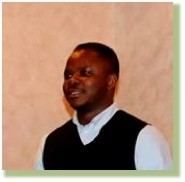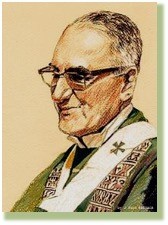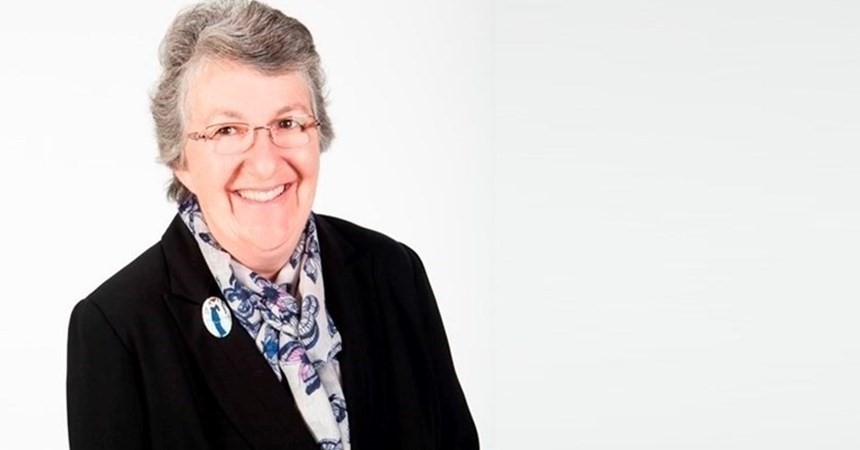The Mass was enhanced by the music and the great participation of all who came along to witness this step in Solomon’s vocational call and his ongoing response. I was struck by the diversity of cultures present among the many seminarians there, from the Good Shepherd Seminary as well as in our own community.
 I must admit that the readings of the Twenty-Eighth Sunday in Year B (Wisdom 7:7-11; Hebrews 4:12-13 and Mark 10:17-30) are simply profound. However, I will share with you the reading from Hebrews, because it struck a chord with me from some of what I read about Unknowing during the past week in Richard Rohr’s Daily Meditations.
I must admit that the readings of the Twenty-Eighth Sunday in Year B (Wisdom 7:7-11; Hebrews 4:12-13 and Mark 10:17-30) are simply profound. However, I will share with you the reading from Hebrews, because it struck a chord with me from some of what I read about Unknowing during the past week in Richard Rohr’s Daily Meditations.
The word of God is something alive and active; it cuts like any double-edged sword but more finely: it can slip through the place where the soul is divided from the spirit, or joints from the marrow; it can judge the secret emotions and thoughts. No created thing can hide from him; everything is uncovered and open to the eyes of the one to whom we must give account of ourselves. (Hebrews 4:12-13)
 I am conscious of the power of this reading on the day when Archbishop Oscar Romero was declared a saint. The movie of his life, but mostly of his conversion to speak out against El Salvador’s political regime, which murdered thousands who worked courageously for those who were on the margins, formed a critical part of the Social Justice unit I taught to Year 10 students. It opened their eyes to the real place of God and of the Church in our lives, of the centrality of the Eucharist, of the dignity of all human beings, of a preferential option for the poor, to solidarity with those who are deemed as being on the outside and of the need to work towards the common good for all humanity and creatures who inhabit earth, our common home. His conversion, ensuing struggle and awakening and eventual assassination keeps alive in me the realisation of how God calls each of us when we least expect it, with an unknown outcome to those who say yes.
I am conscious of the power of this reading on the day when Archbishop Oscar Romero was declared a saint. The movie of his life, but mostly of his conversion to speak out against El Salvador’s political regime, which murdered thousands who worked courageously for those who were on the margins, formed a critical part of the Social Justice unit I taught to Year 10 students. It opened their eyes to the real place of God and of the Church in our lives, of the centrality of the Eucharist, of the dignity of all human beings, of a preferential option for the poor, to solidarity with those who are deemed as being on the outside and of the need to work towards the common good for all humanity and creatures who inhabit earth, our common home. His conversion, ensuing struggle and awakening and eventual assassination keeps alive in me the realisation of how God calls each of us when we least expect it, with an unknown outcome to those who say yes.
So I share with you the words of Richard Rohr from Wednesday 10 October in his writing about the God Particle:
Rick Hocker, a friend and author of the delightful allegory Four in the Garden, recently shared this reflection with me. I hope it will give you a taste of the “unknowing” experience I am trying to describe.
And even for those who seek, God often seems to be elusive. Why? Perhaps it is because God is closer than we can objectively or outwardly see.
“Do you not know that you are a temple of God and that the Spirit of God dwells in you?” (1 Corinthians 3:16). This same God who dwells in unapproachable light (1 Timothy 6:16) chooses to dwell inside creation.
Let’s consider a drop of water as a metaphor for God’s indwelling presence. Waterdrops in the atmosphere are created when water vapor condenses on tiny particles of dust. At the center of every waterdrop is a particle. Similarly, every soul is wrapped around a particle of God, but this particle, although small, is boundless since the infinite God isn’t confined. God is found at your innermost center . . . and beyond.
It’s not just that God dwells inside you, but God is at the center of your spiritual makeup, an integral and enduring part of who you are. God is not added to you, but you are added to God. God is the foundation onto which your soul is built. Everyone you meet is also a God-particle wrapped in a soul.
Teresa of Ávila (1515-1582) describes the soul as a castle with a series of mansions through which we journey. She wrote that God’s mansion “is the center of the soul itself.” If we were to plunge into our innermost center, we would find God. The practice of contemplation or “centering” ourselves is, in essence, reconnecting with God as our center.
So how do we encounter God when God is found at our center? First, we must believe that our connection to God already exists. Our belief in connection creates connection from our side (we can never not be connected to God). Second, we quiet our minds and peer inward with our heart’s eyes, placing our consciousness at our innermost center as best we can. This inward gazing is like diving into a well, but the well is full of debris. When we encounter debris, we lay hold of it, bring it to the surface, and deal with it courageously. Otherwise, it will block our way. We find God by peeling away ourselves. God is hidden treasure (Matthew 13:44) buried in the center of our souls, and we can find God when we tear away the onionskin layers of self.
If we persevere in clearing this well of its clutter, we’ll discover that the water of this inner well—the water in which we’re swimming—is God. We’ll find ourselves floating in God, encompassed by love. In a wonderful reversal, soul is now wrapped in God, and God moves to the outside as described in John 7:37: From our “innermost being will flow rivers of living water,” which is God’s self-spilling out into our life and into the lives of those we touch.
Oh to have this absolute sense of God’s dwelling within and also beyond. This is surely our destiny or as it says in the reading from the Book of Wisdom:
I reckoned no priceless stone to be her peer, for compared with her, all gold is a pinch of sand, and beside her silver ranks as mud.

As sharers in God’s divine nature and God’s plan for creation, I attended the Living the Change documentary film at Adamstown Uniting Church on Sunday afternoon. This documentary explores solutions to the global crises we face today – solutions any one of us can be a part of – through the inspiring stories of people pioneering change in their own lives, and in their communities, in order to live in a sustainable and regenerative way. It was an inspirational documentary which has left me with further deep pondering. I was disappointed that so few people attended because of the powerful nature of what was presented. The film was produced by Charles Eisenstein whose philosophy is worth exploring, as it seems to fit into our understanding of the unifying principle we call love. He speaks of being in a space between stories, of being on a mission of healing, and of the emergence of a new story on this earth, beyond separation. I will explore this in more detail in future messages, because it seems to align with the question that is being asked for our Plenary Council – What do you think God is asking of us in Australia at this time?
I finish this week’s message with one of the verses from The Summons by John L Bell which was sung at Mass on Sunday:
Will you love the ‘you’ you hide
If I but call your name?
Will you quell the fear inside
And never be the same?
Will you use the faith you’ve found
To reshape the world around
Through my sight and touch and sound
In you and you in me?
I just wish we were able to get the depth of our message of life, love and living out there – being disciples, teaching disciples and growing disciples.

